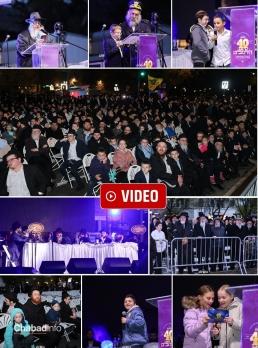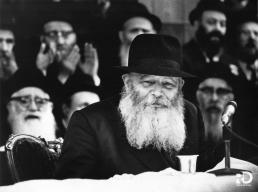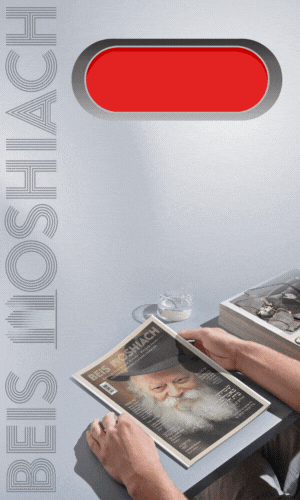Beis Moshiach: Tanya In Tales
There’s nothing like a story to bring a lesson home. In honor of the new study cycle of Tanya starting on Yud Tes Kislev, Beis Moshiach launches a new column which will bring a collection of short stories compiled by Rabbi Mendy Crombie that illuminate and “teach” the chapters of Tanya we will be studying that week • By Beis Moshiach Magazine • Full Article
Menachem Mendel Crombie, Beis Moshiach
Mesaprim Tanya – The stories that teach Tanya aren’t just any stories. This is the first attempt of its kind to enrich the study of the Alter Rebbe’s sefer, the foundational sefer of Chabad Chassidus, with stories of Chassidim that bring out the ideas of Tanya.
It is my privilege to be one of the Rebbe’s army of shluchim in spreading the wellsprings outward and to work, primarily, in giving Tanya classes to groups and individuals. During the classes, I have seen, time and again, the enormous benefit in stories. Therefore, I started writing the stories I’ve collected over the years, as well as collecting additional stories from many sources, which can enrich the learning. When I was done, I had compiled about a thousand stories.
Learning Torah through stories is nothing new. It is the way that the Torah chose to teach its lessons, as the Rebbe put it:
“The form of a story does away with a child’s fear in learning something difficult that he might not understand intellectually and it arouses his interest so he will want to hear more and more. So too with all parts of Torah, the word ‘Torah’ from the root hora’a, in that the instructions of Torah were said in story form and when the instruction is in the form of a story, it is more readily accepted by the heart of a child.”
It seems that the value of stories in learning Tanya is many times greater. Tanya is unlike other sefarim. Tanya does not merely explain abstract subjects. Its entire purpose is to provide counsel in the service of G-d. As the author writes in his introduction to the sefer, “It is, in its entirety, answers to many questions which are asked continuously by Anash … so as to receive guidance for themselves in the service of G-d,” which is why Chassidim called it “The Book of Advice.”
Stories of Chassidim that pertain to the subject being learned, transform the ideas into a way of life. Through them, a window is opened through which the reader can enter the world of Chassidim who worked on themselves and actually implemented the path forged by the Tanya, learning what the practical meaning of the idea in the book is and seeing how the counsel it provides leads to results in the daily challenges of life.
This was told about learning Tanya in Lubavitch from Rabbi Chanoch Hendel, “The stories he would tell to explain some idea in Tanya, whenever he taught, were life-giving.”
This book does not contain stories about Tanya (its printing, segulos, etc.) which were already collected in various places (ex. The Tanya – Its Story and History by Rabbi Sholom Dovber Avtzon). This book contains only those stories which bring out and teach concepts in the sefer.
Based on the verse, “For this matter is very near to you in your mouth and your heart to do it.”
The Tanya explains how fulfilling Torah and mitzvos is close to every Jew.
The Chassid, Rabbi Yosef Wineberg would give Tanya classes on the radio which were edited by the Rebbe. One time, he asked the Rebbe:
It is known that the first part of Likutei Amarim explains the verse, “For this matter is very near to you,” and the section Shaar Ha’Yichud v’ha’Emuna explains the verse, “And you shall know this day and return etc.” Is it correct to say that all details in both these parts explain these verses?
The Rebbe crossed out the Hebrew word that expressed the question so that his answer read as a statement, “It is correct that it all comes to explain this.”
(Teshura Chamishim Shana l’Shiurim b’Radio)
Likutei Amarim
When the Rebbe Rashab visited Vienna, one of the elders there who did not recognize him said, “Yungerman! What will be? It’s all in the mind? A bit is needed in the heart too!”
The Rebbe asked him, “So what should be learned?”
The old man said, “Thank G-d, we have a precious booklet called Likutei Amarim,” and he showed it to the Rebbe.
The Rebbe took the sefer, looked at it and said, “Yes, it’s a fine book.”
(Sefer HaSichos 5681 p. 23)
Sefer shel Beinonim
The hero of the Tanya is the beinoni; hence the name of the sefer, Sefer shel Beinonim.
When the Alter Rebbe sent his manuscript to be printed, he warned the messengers to read and look “until here and no more.”
But their eyes continued further and they saw another line which said, “Until here is the book of the beinonim and from here on that of tzaddikim.”
(Teshura Gluckowsky 5772)
The Shpole Zeide went to the Alter Rebbe and said, “You began to write the Sefer shel Tzaddikim but the world cannot bear it, which is why this generated a heavenly accusation and they decided that this book would be burned and I will rise up in that flame to heaven.”
And so it was that at the time a fire consumed the Sefer shel Tzaddikim and some simanim of Shulchan Aruch, the Shpole Zeide passed away.
(Marei Mekomos, He’aros v’Tziyunim l’Sefer shel Beinonim)
Approbations
The Alter Rebbe wanted two of his colleagues, Rabbi Yehuda Leib HaCohen and Rabbi Zushe of Anipoli, to give their approbation to the sefer before it was published and he sent them the manuscript.
When the Alter Rebbe’s messengers brought the handwritten Tanya to Anipoli, to Rabbi Yehuda Leib HaCohen and Rabbi Zushe to receive their approbations, they left the booklets overnight so the tzaddikim could examine them.
When R’ Yehuda Leib HaCohen examined it, he was enormously impressed and excited and being unable to contain his great emotions he decided to walk to R’ Zushe and share his enthusiasm for the Tanya.
The same thing happened to R’ Zushe who also could not contain his enthusiasm and decided to walk to R’ Yehuda Leib.
They met on the bridge that connected the two parts of Anipoli and they began to dance there in great joy “until Anipoli was on fire …”
The two tzaddikim expressed their amazement about the sefer. R’ Yehuda Leib said: “The Tanya is an incense for all spiritual plagues of the ‘heels of Moshiach.’”
R’ Zushe said: “With the book of Tanya, Jews will go out to greet Moshiach Tzidkeinu.”
(Shiurim b’Sefer HaTanya)
Another version is recounted:
The Alter Rebbe once went to R’ Zushe in Anipoli. R’ Yehuda Leib was there at the time and the two men were sitting with their back to the doorway. When the Alter Rebbe opened the door, R’ Zushe sensed it and stood up and said, “What did you bring from materialistic Lithuania?”
The Alter Rebbe gave R’ Zushe and R’ Leib some handwritten booklets of Tanya and immediately left. R’ Leib also left and went home.
When R’ Zushe examined the manuscript he was very excited and couldn’t refrain from telling R’ Leib. R’ Leib was also greatly impressed and he went to tell R’ Zushe. The two tzaddikim met in the middle and were very amazed by this.
*
When the Alter Rebbe sent the printer, R’ Yisrael Yaffe, with the Tanya to get the approbations of his colleagues, he first sat down to write a letter to R’ Zushe of Anipoli. He started the letter with “HaGaon” and said to R’ Yisrael, “Don’t wonder about my writing ‘HaGaon.’ I know that he is a gaon.” And the Alter Rebbe recounted, “Once, the Maggid of Mezritch came to the Beis Medrash and asked, ‘Why is everybody studying Nistar and not involved in Nigleh? You need to be involved in Nigleh too,’ and he had me and R’ Shimshon of Shipetovka study Nigleh.
“One day, we worked hard on a certain din in the Rambam that was very difficult and we did not find any explanation so that we decided unlike the Rambam. In the meantime, R’ Zushe came and said, ‘What is difficult for you here?’ We told him. [The Alter Rebbe said parenthetically that if it would have been someone else, they wouldn’t have responded but we knew who R’ Zushe was, which is why we responded.]
“R’ Zushe took a piece of paper and went somewhere and wrote on the paper and came and said to us, ‘Examine well what I wrote and it will be explained to you.’ We saw that he had written sources in Shas and poskim which amazed us and, indeed, the Rambam was resolved according to these sources.
“We asked him, ‘How did you know this?’ and he said, ‘While you were having a hard time with the Rambam, the Rambam was not having it good in Gan Eden and when you decided unlike him, it was even worse for him. The Rambam came to me and said, ‘I’ll dictate and you write.’ The Alter Rebbe said to R’ Yisrael, ‘So you see he is a gaon!’”
Before R’ Yisrael set out, the Alter Rebbe told him that as he traveled via Berditchev he should not stay with the tzaddik Rabbi Levi Yitzchok since he did not want him to be spoken to regarding the purpose of the trip. When R’ Yisrael reached R’ Levi Yitzchok and was asked the purpose of his trip, R’ Yisrael gave him some excuse. Afterward, as they sat down to eat, R’ Levi Yitzchok asked him again and R’ Yisrael once again gave some answer, and then again a third time. R’ Yisrael did not reveal the truth.
From there, R’ Yisrael went to R’ Zushe and when he arrived, he said, “Rabbeinu sent this to your honor for you to give an approbation to his Tanya.”
R’ Zushe said, “Certainly, certainly it ought to be given.”
R’ Yisrael said, “He said not to write his name in the approbation.’
R’ Zushe said, “No, no, I will write it, so everyone will know who did this.”
R’ Yisrael said, “He told me that if you write his name I should not take the approbation.”
R’ Zushe said, “So, I won’t write it. They will know on their own. Who could write this other than Reb Zalmanke? Bring me paper.” He immediately said again, “How much more paper will you bring?”
When R’ Yisrael was surprised by this question, R’ Zushe said, “Go and bring a lot of paper!” But then R’ Zushe said to himself, “Will we be able to write his praises on a large amount of paper? Bring a quarter sheet of paper.” R’ Yisrael brought it and he wrote.
From there, R’ Yisrael went to R’ Yehuda Leib and after he wrote his approbation, he said to R’ Yisrael, “Please look, did I write it nicely?”
R’ Yisrael said it was surely fine and R’ Yehuda Leib said, “See what I wrote, ‘and now Israel will rejoice’ – I refer to the Baal Shem Tov who was in the chamber of Moshiach and asked him, ‘When are you coming, sir?’ and he said, when one of your students arises and spreads your wellsprings outward. He was referring to the Alter Rebbe.’”
(Ramach Osiyos, os 218)
*
Near Liozna lived a poor Chassid who taught in the cheder and sold bagels which his wife baked.
One night, a wayfarer spent the night and in the morning, the melamed found a bundle of money. He waited many days for the guest to return and when he did not not, he asked the Alter Rebbe what to do with the money.
“Hashem sent you a treasure and nobody will come to ask for it,” said the Rebbe. “In the meantime, keep it a secret and continue teaching your students. When the semester ends, come to me and I will advise you what to do next.”
The semester ended and the melamed went to the Rebbe who said, “Move to Liozna and rent an apartment with a store. Buy merchandise from a wholesaler and next year I will advise you want to do next.”
The Chassid stopped teaching and began doing business. A year later he returned to the Rebbe.
“Don’t buy merchandise from the local person anymore. Go to Vitebsk, buy merchandise there and sell it to merchants in Liozna and the area,” said the Rebbe. The Chassid did so and did very well.
“What shall I do now?” he asked the Rebbe a year later.
“The merchants in Vitebsk buy their merchandise in Moscow. Go to Moscow too and supply merchandise to the merchants in Vitebsk and Liozna,” said the Rebbe and the Chassid became one of the biggest merchants in Russia.
A year later he returned to the Rebbe to get advice.
“The merchants in Moscow buy their merchandise in Königsberg. Go there too, buy merchandise and sell it to the merchants in Moscow,” said the Rebbe.
The Chassid’s fortune grew. He remembered that it wasn’t to his credit and before each trip to Königsberg he went to the Alter Rebbe to ask for his blessing.
One time, before traveling to Königsberg the Rebbe asked him, “Why haven’t you ever brought me a gift from Königsberg?” The Chassid was taken aback. Actually, why hadn’t he ever done so? It was ingratitude on his part!
When the Chassid went to Königsberg he went around to the stores that sold expensive souvenirs and finally chose a snuff box made of gold.
“You have brought me a fine gift but this is not what I meant,” said the Rebbe, gazing at the expensive snuff box.
The next time he went to Königsberg he bought a more beautiful snuff box and hoped that this time the Rebbe would be pleased.
To his disappointment, the Rebbe was unimpressed by the gift’s sparkling beauty and said, “This is not what I had in mind.”
The Chassid planned on traveling once again to Königsberg and before setting out he went to the Rebbe to receive his blessing.
“Do you ever visit the theater in Königsberg?” asked the Rebbe.
The Chassid had never gone to the theater in his life but this time, when he got to the big city, he bought an expensive ticket for the next performance. He sat on the upholstered seat and promptly fell asleep.
The curtain fell, the audience left, and only the tired Chassid continued to sleep. He suddenly felt a hand on his shoulder shaking him. He opened his eyes and saw a custodian.
“Sir, the performance ended a while ago. Please go home and let me clean up,” said the man as he continued to sweep.
The Chassid got up and started to leave when the custodian looked at him and asked, “Where are you from?”
“Russia,” said the Chassid.
“Which city?” asked the man.
“Liozna,” said the Chassid.
“Do you know Rebbe Zalmena?” the man inquired.
“Certainly. I am his Chassid,” said the bewildered Chassid. “How do you know the Alter Rebbe and why do you call him ‘Zalmena’?
“Give him my regards,” the man requested.
“I will. What is your name?” asked the Chassid.
“Carl,” said the man and he went back to sweeping.
When the Chassid returned to Liozna he gave regards from Carl. “That is the present I wanted!” exclaimed the Rebbe.
Before the Chassid went to Königsberg again, the Rebbe gave him a small package wrapped in paper.
“When you get to your destination, give this package to Carl. When you want to return home, ask him to give the package back to you.”
As soon as he arrived in Königsberg, he went to the theater and waited for Carl. “The Rebbe gave me something,” he said and held out the wrapped item.
When the Chassid finished doing business in the city, he went back to the theater and asked Carl to give him the package. “Is that what the Rebbe said?” wondered Carl.
“Yes, the Rebbe asked that the package be returned to him,” said the Chassid.
Carl wondered, “Did he really say that?”
He removed the paper and they could both see the Tanya, handwritten by the Alter Rebbe. Carl looked at it and mumbled to himself several times, “Ruach ha’kodesh … ruach ha’kodesh … real ruach ha’kodesh. I don’t know what Moshiach can innovate …”
He finally closed the sefer and gave it to the Chassid.
The mashpia, Rabbi Shmuel Gronem told this story and said, “Apparently, Carl was one of the thirty-six hidden tzaddikim and the Alter Rebbe wanted to receive his approbation for the Tanya.”
(Reshimos Devarim, 5769 edition, p. 82)
“Listen to me those who pursue righteousness, those who seek G-d.
The Alter Rebbe begins his introduction with a verse from Yeshaya.
A bachur from a Litvishe family heard a lot about the mashpia, Rabbi Nissan Nemenov and he went to him during intersession in Nissan to ask him to teach him Chassidus. R’ Nissan immediately agreed and began teaching him every day including erev Pesach. They learned maamarim from Likutei Torah and maamarim about avoda from the Rebbe Rayatz. He said, “Nissan can help you in Nissan.”
Said the bachur, “When I went to say goodbye before I returned to yeshiva, R’ Nissan wished me, ‘May Hashem help that you be called ‘one who seeks G-d,’ for otherwise, the Alter Rebbe is not speaking to you altogether.’ R’ Nissan explained what he meant. In his introduction to Tanya, the Alter Rebbe writes, ‘Listen to me those who pursue righteousness, those who seek G-d,’ which means that one who is not in the category of seeking G-d is not being addressed by the Alter Rebbe!”
(R’ Nissan p. 405)
With difficulty can he see the light that is good that is hidden in books.
A book cannot always help a person who seeks answers to his questions because he is not always successful in seeing the light that is to be found in the book.
The mashpia, Rabbi Shmuel Levitin would learn with the Chassid, Rabbi Leib Moneszon. Once, when R’ Leib was in yechidus, the Rebbe Rashab said they should review the maamar “with the same words that they heard me use and not as they heard it during the review.”
R’ Leib asked, “We can read it, for the Rebbe wrote the maamar!”
The Rebbe said, “When you hear words, they are more readily grasped and they are more alive to the listener. Unlike the light hidden in sefarim, like that which is cited, that the light created on the first day of creation was hidden by G-d in the Torah.”
(Nitzutzei Ohr p. 42)
Which are usually divided into three: right, left and center which are chessed, gevura, etc.
Neshamos are generally divided into three categories: neshamos of chessed, neshamos of gevura and of tiferes, corresponding to the three lines by which the supernal sefiros are divided.
The Maggid of Mezritch’s left leg was lame. They say in the name of the Alter Rebbe that the reason is because the Maggid was an “adam ha’shaleim” [perfect man] and in the holy Zohar it says that an “adam ha’shaleim” moves worlds with every one of his limbs. Since the right side is chessed and gevura is left, he limped on the left so as not to arouse judgment.
(Reshimos Devarim 5769, p. 68)
*
The magazine can be obtained in stores around Crown Heights. To purchase a subscription, please go to: bmoshiach.org
339
Join ChabadInfo's News Roundup and alerts for the HOTTEST Chabad news and updates!










































